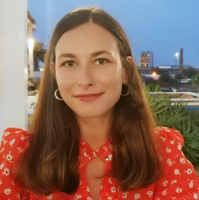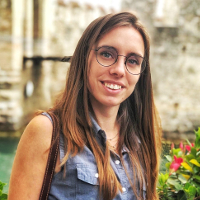Prof. Corbetta’s interview on Telenuovo TV “TG PADOVA”
(Italian Only) Prof. Corbetta was interviewed on March 31th, 2022
Click here to see the calendar of the scheduled Distinguished Lectures and Seminars
(Italian Only) Prof. Corbetta was interviewed on March 31th, 2022
(Italian version only) Article on “Il Gazzettino”, March 31th, 2022
(Italian version only) “La Piazza Web” talks about the upcoming event.
(Italian version only) Article on the March 29th edition of “Il Mattino di Padova”
(Italian version only) Interview on “Il Mattino di Padova”, March 29th, 2022
by dr. Valentina Baro, MD, Department of Neuroscience, Padova
When: April 14th, 2022 – 3:00 pm
Where: in-person seminar, Sala Seminari, VIMM. Recording available on Mediaspace
Abstract: The clinical assessment of brain pathologies has been increasingly dependent on advanced magnetic resonance imaging (MRI) techniques in order to infer lesion pathophysiological characteristics, such as hemodynamics, metabolism, and microstructure. Advanced techniques in computed tomography, MRI and positron-emission tomography have further improved the visualisation and localisation of brain pathologies especially in neuro-oncology, providing target definition for various therapeutic modalities. Additional refinements of newer imaging methods, such as MR Spectroscopy, functional MRI, diffusion MRI and diffusion tensor imaging, have allowed a more detailed and accurate definition of tumour features and the relation with eloquent brain tissue.
When: Apr 7th, 2022 – starting at 10:00 am
Where: Sala dei Giganti, Palazzo Liviano, Padova
Abstract: “Le stagioni del cervello” è il tema dell’edizione 2022 della Settimana mondiale del cervello: conoscere come funzione il cervello nelle varie fasi della vita, come proteggerlo fin dalla giovane età e come mantenerlo attivo nell’invecchiamento è una priorità di benessere e salute pubblica.
A Padova il 7 aprile presso la Sala dei Giganti si tiene una giornata dedicata a questi obiettivi: in mattinata viene dedicata attenzione alle fasi evolutive del cervello con interventi educativi sui tics e il loro stigma, sull’impatto della musica nell’allenamento del cervello; a seguire, un momento musicale con studenti, studentesse e docenti.
When: April 5th, 2022 – 6:30 pm
Where:
Abstract: ….da dove vengono i pensieri, le emozioni, e come prendiamo le decisioni che nel piccolo e nel grande determinano la nostra vita? Che cosa sono il senso morale e l’etica? Dove finisce la biologia e dove inizia la cultura?
Per quasi venti secoli i filosofi e gli scienziati localizzarono nel cuore la sede delle attività mentali superiori, ed è solo dalla metà del 1600 che il cervello è considerato il centro delle facoltà intellettive.
by dr. Marco Mainardi, Istituto di Neuroscienze, Consiglio Nazionale delle Ricerche – Pisa
When: March 24th, 2022 – 3:00 pm
Where: Zoom meeting. Recording available on Mediaspace
Abstract: Plasticity of synaptic connections adjusts the signal flow across neural circuits to
support the acquisition and storage of information. Dendritic spines host most excitatory
synapses in the brain and incessantly remodel to meet the computational demands for
acquisition or recall of new episodic memories, or goal-oriented behavioral schemes.
Despite the obvious physiological importance of synaptic plasticity and its implications in
pathological contexts, appropriate tools for the specific analysis of potentiated synapses
are scarce.
by prof. Alessandra Del Felice, Dep. of Neurosciences – University of Padova and prof. Emanuele Menegatti, Dep. of Information Engineering – University of Padova
When: March 17th, 2022 – 3:00 pm
Where: Sala Seminari at VIMM, Via Orus 2b, Padova, Zoom meeting (Recording available on Mediaspace)
Abstract: Robotic devices have seen an increasing uptake in neurorehabilitation, due to the higher intensity and larger therapeutic exercise doses they can provide. More recently, robots have also entered the market as assistive wearable devices – i.e. to enhance or integrate human body performance.
However, the human and the robot are usually considered as two separate entities interacting via a fixed and immutable interface and the robot is seen as a mere actuator of pre-designed motions.


Carola Dell’Acqua and Elisa Dal Bò, both Doctoral students at PNC working with the psychophysiology lab of the Department of General Psychology, have recently published a longitudinal study aimed at examining whether the predictive role of anxiety on the development of pandemic-related post-traumatic stress symptoms was modulated by individual differences in neural activity during the processing of emotional stimuli.